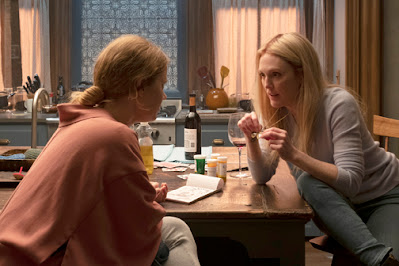This one should have been a slam-dunk, because the premise is irresistible.
And classic.
(Alfred Hitchcock certainly thought so, back in the day.)
 |
| Jane (Julianne Moore, right) proudly shows Anna (Amy Adams) a photo of her son, which she keeps in a locket. |
Trouble is, we’ll likely never see the film this team created.
The Woman in the Window became an orphan when its studio parent, Fox 2000, was absorbed by Disney in March 2019. (In a demonstration of childish behavior akin to Nature at her cruelest, takeover studios rarely embrace projects birthed by the vanquished “parent.”) Bowing to unfavorable test screenings, Disney demanded re-shoots and new material scripted by an uncredited Tony Gilroy.
What now has hit the screen is awkward, to say the least. And I can’t imagine this version is superior to what Wright and Letts delivered the first time.
New York City-based child psychologist Anna Fox (Adams), crippled by a severe case of agoraphobia, has been unable to leave her Manhattan brownstone for nearly a year. She’s trying to work this out via frequent sessions with her visiting psychiatrist, Dr. Landy (Letts, in a solid cameo).
He has put her through an ongoing cocktail of prescription drugs; the most recent, Elevan, comes with a strict warning not to mix it with alcohol. Which doesn’t stop Anna from drinking a lot of wine.
She’s estranged from her husband Ed (Anthony Mackie) and their daughter Olivia (Mariah Bozeman), although they chat daily on the phone. Anna also has the company of a tenant: aspiring musician David Winter (Wyatt Russell), who lives in the basement, runs errands for her, and handles odd jobs throughout the house.
Anna passes the time by watching classic film noirs — a brief clip from Hitchcock’s Spellbound is a bit on the nose — and observing the comings and goings in the buildings across the street, from the safety of her front windows. She therefore notices when a new family, the Russells, moves in directly opposite her brownstown. She’s charmed when 15-year-old Ethan (Fred Hechinger) pays a visit, to give Anna a “hello” gift from his mother.
Anna immediately senses that Ethan is oddly uncomfortable, perhaps distracted, for some reason he’s much too shy to share. They nonetheless part as friends.




